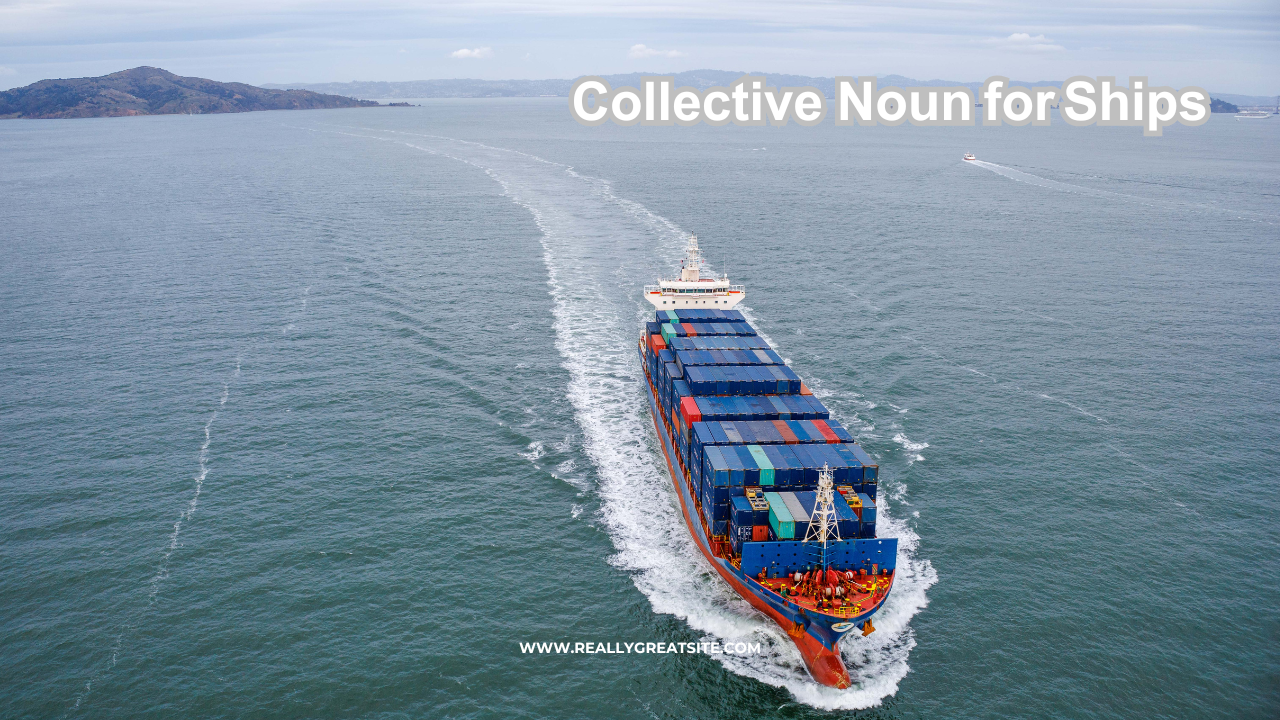The collective noun for ships is a fleet. Other group names include armada, convoy, and flotilla, depending on the type, size, and purpose of the ship grouping.
NOUN | COLLECTIVE NOUN | USAGE EXAMPLE
| Ships | Fleet | A fleet of ships was anchored at the port. |
|---|---|---|
| Ships | Armada | An armada of warships sailed into the harbor. |
| Ships | Convoy | A convoy of cargo ships crossed the Atlantic. |
| Ships | Flotilla | A flotilla of patrol boats guarded the coastline. |
What is a Group of ships called?
A group of ships is most commonly called a fleet. However, depending on the purpose, size, or historical context, terms like armada, convoy, and flotilla are also used.
| Collective Noun | Definition | Size | Purpose | Common Usage |
|---|---|---|---|---|
| Fleet | A group of ships under one command or ownership | Medium to large | Military, commercial, general | Navy fleets, shipping fleets |
| Armada | A large and powerful group of warships | Very large | Military/offensive | Historical/naval warfare |
| Convoy | Ships traveling together for protection | Variable | Safety in transit | Wartime or long-distance travel |
| Flotilla | A small group of light, fast naval vessels | Small | Patrol, quick operations | Coastal/naval missions |
A Fleet of Ships
A fleet is a group of ships operating together under one command or ownership.
Example sentences:
- The fleet of navy ships was deployed for training.
- A fleet of fishing boats returned to the docks.
- The company’s fleet of cargo ships spans five continents.
An Armada of Ships
An armada is a large, powerful group of warships assembled for battle.
Example sentences:
- The Spanish Armada was one of the largest naval forces in history.
- An armada of destroyers lined up for the naval parade.
- The ancient harbor was built to protect an armada from invasion.
A Convoy of Ships
A convoy is a group of ships traveling together for safety, often with military protection.
Example sentences:
- The convoy of supply ships was escorted by navy vessels.
- A convoy of humanitarian ships arrived with aid.
- During wartime, convoys reduced the risk of submarine attacks.
A Flotilla of Ships
A flotilla is a small fleet of light or fast naval vessels moving in coordination.
Example sentences:
- A flotilla of speedboats approached the harbor.
- The navy sent a flotilla to patrol the coastal border.
- The lake was dotted with a flotilla of recreational boats.
Interesting Facts About Ships:
- The largest ship ever built is the Seawise Giant, longer than the Empire State Building is tall.
- Container ships carry over 90% of the world’s traded goods.
- The Titanic was once considered unsinkable—but sadly proved otherwise.
- Modern warships can operate nuclear-powered and stay at sea for months.
- Submarines are also part of naval fleets, though they operate underwater.
QUIZ MCQs
Fleet Convoy Armada Flotilla
Fleet Armada Flotilla Convoy
Speed operations War battles Safety during travel Fishing
Massive warships Merchant cargo ships Passenger liners Small light naval vessels
Armada Fleet Convoy Flotilla
Answers and Explanation
- Fleet – A fleet is the general term for a group of ships under one control.
- Armada – An armada is a very large group of warships, often used in historical battles.
- Safety during travel – A convoy protects ships from threats while traveling, especially in war.
- Small light naval vessels – A flotilla includes small, fast ships often used for patrol or support.
- Armada – Historically, armadas were massive war fleets used to invade or attack.
Conclusion:
Ships play a vital role in transportation, trade, defense, and exploration. Whether you’re referring to a fleet, armada, convoy, or flotilla, each collective noun reflects a different aspect of how ships are grouped and used. Understanding these terms enriches both language skills and maritime knowledge.






Wishing you happiness every day.
房中秘术、泡妞把妹、丰胸美体、奇淫巧技!价值十万电子书下载网址:https://www.1199.pw/
Hi, how have you been lately?
真免费!价值万元资源,不要一分钱,网址:https://www.53278.xyz/
益群网:终身分红,逆向推荐,不拉下线,也有钱赚!尖端资源,价值百万,一网打尽,瞬间拥有!多重收益,五五倍增,八级提成,后劲无穷!网址:1199.pw